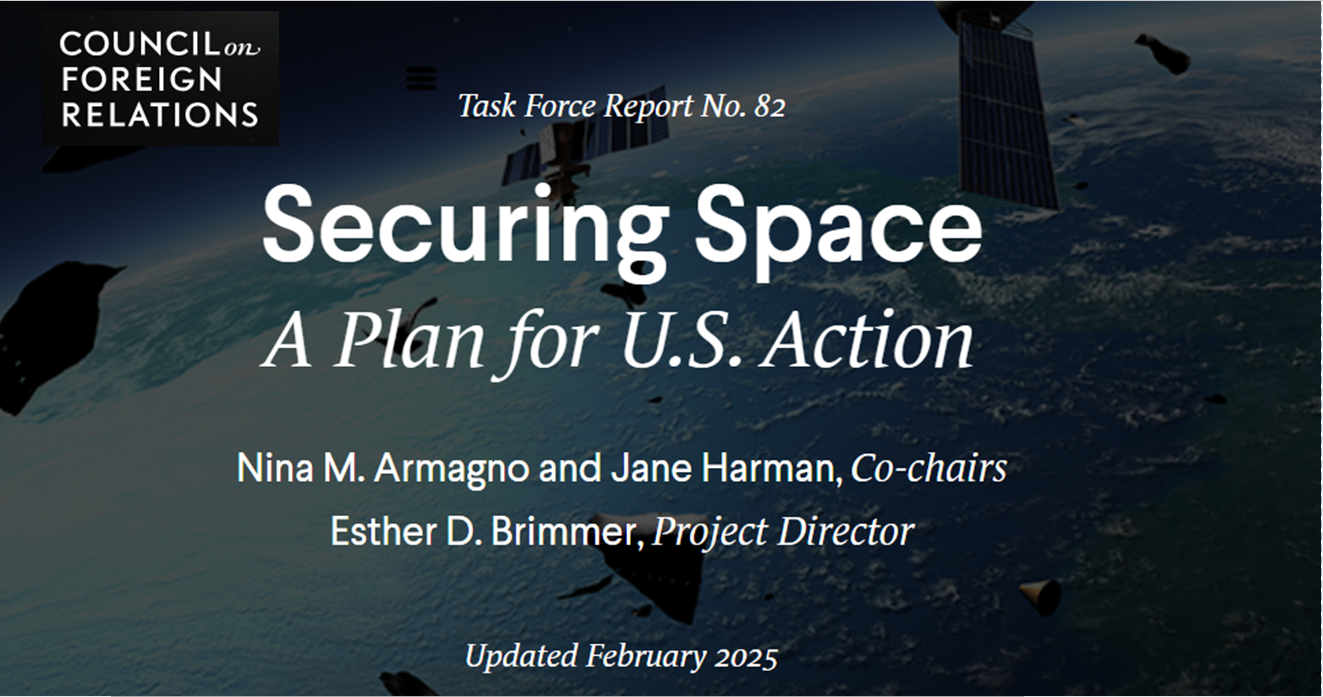CDE director Laura DeNardis serves on Council on Foreign Relations task force, which releases new report on space security
CDE director and Council on Foreign Relations (CFR) member Laura DeNardis serves on what CFR President Michael Froman has called a “blue-ribbon Task Force” to address “unprecedented technological and geopolitical shifts in the space domain.” On February 11, 2025, the Council released the Task Force’s report, Securing Space: A Plan for U.S. Action , which asserts that as the United States adapts to the changing commercial, technological, and national security landscape in space, it needs to “make space a top national priority and commit to revitalizing U.S. leadership in space.”

Professor Laura DeNardis
“Advancing space management policy should be a priority for both the executive and legislative branches of government, and national leaders need to work together to fix vulnerabilities and enhance deterrence,” the report declares. The United States “needs to act now to address threats to space assets; champion space traffic management to support the growing space economy; and incorporate commercial perspectives into civilian and national security space policy.”
The Task Force is co-chaired by former Congresswoman Jane Harman and retired Lieutenant General Nina M. Armagno, the first director of staff at U.S. Space Force, and is directed by Esther D. Brimmer , CFR’s James H. Binger senior fellow in global governance. The bipartisan Task Force includes over thirty members including former National Security Advisor Stephen J. Hadley, former US Ambassador to NATO Kay Bailey Hutchison, and former US Congresswoman Jane Harman, who co-chairs the Task Force. Members and observers represent the public sector, private sector, and academia.
“To maintain our strategic edge, the new presidential administration and Congress need to redouble the United States’ commitment to American leadership and sound global governance in space, the report advises. “U.S. leadership in space is critical to U.S. national security, to U.S. global leadership, to U.S. hard and soft power, and to the security and prosperity of the American people. Space assets are vital to modern life, underpinning the United States’ security and prosperity.”
The Task Force warns that “in the increasingly chaotic realm of space, the United States’ position is slipping. In 1957, the Soviet Union’s launch of the Sputnik satellite was a wakeup call, spurring the United States to assume a dominant role in space. Today, nearly seventy years later, the United States is in danger of losing that privileged position. In many ways, the country risks another Sputnik moment.”
China and Russia have “developed the means to divert, disable, or destroy [U.S. space assets]. The methods include electronic warfare and jamming as well as direct-ascent anti-satellite (ASAT) missiles,” posing a direct threat to satellites and other assets that the United States relies on for national security.
Furthermore, while the United States and U.S. companies, such as SpaceX, have dominated the domain, “in the past five years, China has launched over five hundred objects into space, built its own orbiting space station, and placed two landers on the far side of the moon.”
The Task Force is concerned by a lack of international governance mechanisms responsible for creating rules of the road and norms for human activity in outer space, especially those that integrate the voices of commercial and other nonstate actors. The report notes that “unlike aviation, shipping, and telecommunications, the space economy lacks a unified, single international institution that can establish or enforce an agreed-on set of best practices.”
The Task Force proposes a seven-part plan, urging policymakers to reshape its approach to uphold U.S. leadership in this increasingly paramount realm:
- “Make space a top national priority . . . by convening a space summit in the first year of [Trump’s] administration and reassessing priorities to include whether to declare key space systems to be ‘critical infrastructure.’”
- “Revitalize American international leadership in space” by “[instructing] relevant cabinet officers that the United States is to lead the world in space,” “[structuring] the National Security Council staff to support the president in this role,” and potentially utilizing the National Space Council.
- “Fix the vulnerability problem and enhance deterrence,” by “[launching] a space vulnerability, remediation, and deterrence assessment that includes participation by the Department of Defense, the intelligence community, private sector space companies, and representatives of civil space organizations and academic institutions, among other groups.”
- “Sharpen policy on China,” to include “measures to compete successfully with China in space,” as well as “targeted, space-related engagement with China on ‘hotline’ communications, space traffic management, and the rescue of spacefarers in distress.”
- “Build on existing international regimes” and “[develop] ‘rules of the road’ to deconflict space activities, avoid collisions and other accidents, and mitigate risk from space debris.”
- “Incorporate the commercial sector and other relevant nonstate actors,” by “[establishing] a regularly scheduled forum or advisory group that channels expertise from the commercial sector, civil society, and academia into the deliberations of international organizations responsible for managing space traffic and into related diplomatic efforts.”
- “[Treat] space as the common inheritance of all humanity and encourage other states to do so as well.”
The report warns: “Without immediate changes to how space is governed, the benefits of access to space could be lost to everyone. As the leading spacefaring country and the homebase of the most innovative space companies, the United States is uniquely positioned to determine this future.”
To read the report, visit https://www.cfr.org/task-force-report/securing-space .
For more information, please contact the Global Communications and Media Relations team at communications@cfr.org.
